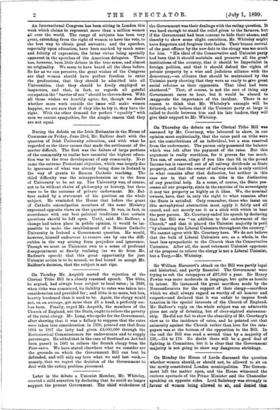On Thursday the debate on the Clerical Tithe Bill was
resumed by Mr. Courtney, who laboured to show, in our opinion most sophistically, that the rates paid on tithe were not the contributions of an individual, but a sum reserved from the endowment. The parson only possessed the balance which was left after the payment of the rates. But this argument is really worthless, for it proves far too much. You can, of coarse, allege if you like that 8d. in the pound Income-tax is reserved out of all railway dividends as State property, and that the owner of railway stock is only entitled to what remains after that deduction, but neither in this case nor in that of rates on tithe is the distinction of any practical help. In a sense, of course, the State pos- sesses all our property, since in the exercise of its sovereignty it may tax property as highly as it likes. We, the nominal owners, have, that is, only the right to what remains after the State is satisfied. Only remember, those who insist on this metaphysical abstraction must apply it fairly and all round, and not merely use it as a stick with which to beat the poor parson. Mr. Courtney ended his speech by declaring that the Bill was "an addition to the endowment of the Church," and that it placed the Unionist majority in peril "by alienating the Liberal Unionists throughout the country." We cannot agree with Mr. Courtney here. We do not believe that the bulk of Liberal Unionists are, as a whole, in the least less sympathetic to the Church than the Conservative Unionists. After all, the most vehement Unionist opponent of the proposal to relieve the clergy is not a Liberal Unionist, but a Tory,—Mr. Whiteley.















































 Previous page
Previous page